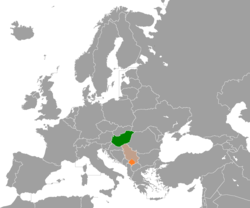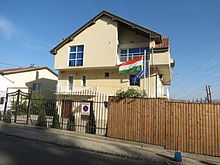| Revision as of 15:36, 1 December 2024 editAuric (talk | contribs)Autopatrolled, Extended confirmed users, Pending changes reviewers186,905 editsm Added {{AI-generated}} and {{Sections}} tagsTags: Twinkle Reverted← Previous edit |
Revision as of 16:38, 1 December 2024 edit undoGjs238 (talk | contribs)Autopatrolled, Extended confirmed users, Pending changes reviewers, Rollbackers146,974 edits Restored revision 1239474138 by Materialscientist (talk): Restore last unspoiled versionTags: Twinkle UndoNext edit → |
| Line 1: |
Line 1: |
|
|
{{Infobox bilateral relations|title=Hungarian–Kosovan|party1=Hungary|party2=Kosovo|mission1=Embassy of Hungary, Pristina|mission2=Embassy of Kosovo, Budapest|envoytitle1=Ambassador|envoytitle2=Ambassador|envoy1=József Bencze|envoy2=Shpend Kallaba}} |
|
{{Multiple issues| |
|
|
|
] |
|
{{AI-generated|date=December 2024}} |
|
|
{{Sections|date=December 2024}} |
|
|
}} |
|
|
'''Kosovo–Hungary Relations''' |
|
|
The relationship between Kosovo and Hungary encompasses a range of diplomatic, political, and economic engagements that have developed since Kosovo's declaration of independence in 2008. Hungary was among the first countries to officially recognize Kosovo's sovereignty, reinforcing its commitment to supporting stability in the Western Balkans. While Hungary has actively contributed to Kosovo's peacebuilding efforts and regional integration, its approach to Kosovo's European Union (EU) aspirations reflects a careful balancing act, shaped by regional geopolitics and its ties with Serbia. This article explores the historical and political aspects of their relations, Hungary's role in Kosovo's development, and the challenges that define this unique partnership. |
|
|
|
|
|
|
|
The '''Hungary–Kosovo relations''' are foreign relations between ] and ]. ] ] from ] on 17 February 2008 and Hungary ] it on 19 March 2008.<ref>{{cite web|url=http://www.mfa.gov.hu/kum/en/bal/actualities/spokesman_statements/Kosovo_recognition_080319.htm |title=Hungary recognizes Kosovo's Independence |date=2008-03-19 |publisher=Ministry of Foreign Affairs of Hungary |access-date=2008-03-19 |url-status=dead |archive-url=https://web.archive.org/web/20080323041624/http://www.mfa.gov.hu/kum/en/bal/actualities/spokesman_statements/Kosovo_recognition_080319.htm |archive-date=March 23, 2008 }}</ref> Hungary has an embassy in ].<ref>{{cite web|url=http://www.mfa.gov.hu/kulkepviselet/Pristina/en/mainpage.htm |title=Embassy of the Republic of Hungary in Pristina |publisher=Hungarian Ministry of Foreign Affairs |access-date=2008-06-27 |url-status=dead |archive-url=https://web.archive.org/web/20080528213220/http://www.mfa.gov.hu/kulkepviselet/Pristina/en/mainpage.htm |archive-date=2008-05-28 }}</ref> |
|
'''Political Relations''' |
|
|
Hungary's Recognition of Kosovo |
|
|
Hungary formally recognized Kosovo's independence on March 19, 2008, just over a month after Kosovo declared itself independent from Serbia. This early recognition aligned with Hungary's commitment to fostering peace and stability in the Balkans. The move also underscored Hungary's alignment with the majority of European Union member states and the broader international community that supported Kosovo's right to self-determination. Hungary's recognition helped strengthen Kosovo's international legitimacy and laid the groundwork for the establishment of bilateral diplomatic relations. Both countries have since established embassies in each other's capitals—Pristina and Budapest—facilitating closer ties and cooperation. |
|
|
|
|
|
|
|
==History== |
|
'''Hungary's Role in Regional Stability''' |
|
|
|
Despite Hungary's recognition of Kosovo's independence, ] ] stated in January 2023 that Hungary would vote against Kosovo's accession to European organizations until a deal was reached with Serbia. In April 2023, Hungary along with ], ], ], ], ], Serbia and ] voted against approving Kosovo's membership in the ].<ref>{{cite news|url=https://www.dailysabah.com/world/europe/serbia-to-alter-foreign-policy-after-eu-kosovo-decision-vucic|title=Serbia to alter foreign policy after EU Kosovo decision: Vucic|newspaper=]|date=2023-04-25|access-date=2023-04-28}}</ref><ref>{{cite news|url=https://www.euractiv.com/section/politics/news/serbia-disappointed-with-ukraine-greece-slovakia-over-coe-kosovo-vote/|title=Serbia ‘disappointed’ with Ukraine, Greece, Slovakia over CoE Kosovo vote|first=Tamara Milošević|last=Grbić|newspaper=]|date=2023-04-26|access-date=2023-04-28}}</ref> |
|
Hungary has been a vocal supporter of regional dialogue and cooperation, advocating for Kosovo's inclusion in frameworks such as the Western Balkans Stabilization and Association Process (SAP) and other regional mechanisms like the Central European Free Trade Agreement (CEFTA). Hungary's involvement reflects its belief that greater economic and political integration is vital for the stability and development of the Balkans. However, its position regarding Kosovo's EU membership remains cautious. Hungarian officials have emphasized the need for Kosovo to resolve its disputes with Serbia, arguing that dialogue and reconciliation are prerequisites for European integration. |
|
|
|
|
|
|
|
==Military== |
|
'''Contributions to NATO's Kosovo Force''' |
|
|
|
Hungary currently has 353 troops serving in Kosovo as peacekeepers in the ]-led ].<ref> www.nato.int Link accessed 21-07-09</ref> |
|
As a member of NATO, Hungary has played a significant role in peacekeeping efforts in Kosovo through its involvement in the Kosovo Force (KFOR). KFOR was established in 1999 to provide security and support post-conflict reconstruction efforts in Kosovo. Hungary has consistently contributed troops and resources, demonstrating its commitment to the mission's goals of maintaining peace and fostering reconciliation among Kosovo's diverse communities. |
|
|
|
|
|
|
|
== See also == |
|
'''Economic and Cultural Relations''' |
|
|
|
* ] |
|
Economic ties between Kosovo and Hungary are emerging, with Hungary showing interest in Kosovo's energy and infrastructure sectors. Hungarian businesses have explored investment opportunities in Kosovo, particularly in areas that align with EU-led modernization projects. |
|
|
|
* ] |
|
On the cultural front, educational exchanges have played a significant role in fostering closer ties. Programs like the Stipendium Hungaricum, a scholarship initiative by the Hungarian government, have enabled Kosovar students to study at Hungarian universities. These opportunities have not only strengthened academic collaboration but also deepened cultural understanding and people-to-people connections. |
|
|
|
* ] |
|
|
|
|
|
⚫ |
==References== |
|
'''Challenges in Relations''' |
|
|
|
{{reflist}} |
|
Hungary's foreign policy towards Kosovo reflects its need to balance support for Kosovo's independence with its strategic partnership with Serbia. Hungary relies on Serbia for energy imports via the Turkish Stream pipeline and has strong economic and diplomatic ties with Belgrade. This dependency influences Hungary's cautious stance on Kosovo's EU membership, as it seeks to maintain stability in its relations with Serbia while supporting Kosovo's development. |
|
|
Additionally, Hungary's internal politics and relationship with the EU shape its approach to Kosovo. The Hungarian government has often clashed with EU institutions over governance and sovereignty issues, and these dynamics impact its broader foreign policy. As a result, Hungary's nuanced position on Kosovo reflects a blend of regional strategy and domestic considerations. |
|
|
|
|
|
|
|
{{Foreign relations of Hungary}} |
|
The relationship between Kosovo and Hungary is a testament to Hungary's strategic engagement in the Western Balkans. Hungary's recognition of Kosovo, contributions to NATO's KFOR mission, and support for regional integration illustrate its commitment to promoting peace and development in the region. However, Hungary's cautious approach to Kosovo's EU membership highlights the complexities of balancing regional diplomacy with strategic ties to Serbia. As Kosovo continues its efforts to gain wider international recognition and pursue European integration, Hungary's role will remain a critical factor in shaping the region's future. |
|
|
|
{{Foreign relations of Kosovo}} |
|
|
|
|
|
|
{{DEFAULTSORT:Hungary-Kosovo relations}} |
|
'''Bibliography''' |
|
|
|
] |
|
1. NATO. KFOR: NATO's Role in Kosovo. Accessed November 2024. NATO Official Website. |
|
|
|
] |
|
2. Kosovo Online. Hungary Will Not Revoke Recognition of Kosovo. Accessed November 2024. |
|
|
|
] |
|
3. Group for Legal and Political Studies. Hungary and Kosovo: A Relationship Shaped by Geopolitics. Accessed November 2024. |
|
|
|
|
|
|
'''Interwiki Linking''' |
|
|
* Kosovo |
|
|
* Hungary |
|
|
* ] |
|
|
* ] |
|
|
|
|
|
|
|
{{Kosovo-gov-stub}} |
|
'''External Sources''' |
|
|
|
{{Hungary-gov-stub}} |
|
* Hungarian Ministry of Foreign Affairs |
|
|
|
{{Bilateralrelations-stub}} |
|
* Kosovo Ministry of Foreign Affairs |
|
|
* NATO KFOR Official Page |
|
|
|
|
| ⚫ |
== References == |
|
|
{{Reflist}} |
|


